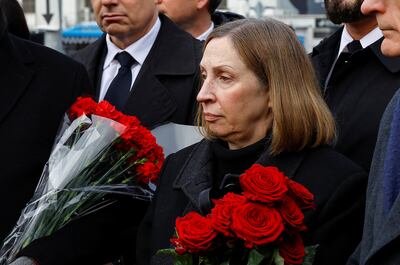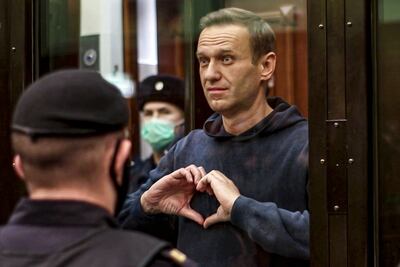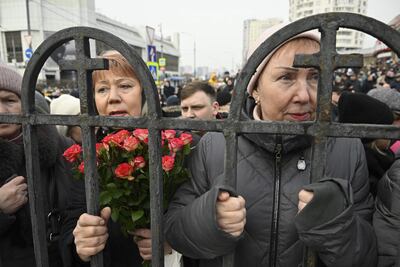Thousands of mourners paid their respects to Russian opposition leader Alexei Navalny in Moscow on Friday, as the Kremlin warned his supporters against holding unsanctioned gatherings.
His widow, Yulia Navalnaya, who did not attend the service in Moscow, paid tribute to the Kremlin critic on social media platform X after his funeral, thanking him for “26 years of absolute happiness”.
“I don’t know how to live without you but I will try my best to make you, up there, happy for me and proud of me. I don't know if I'll manage it or not, but I will try,” she wrote.
Before the service, a large crowd gathered outside the church following a battle with authorities over the release of Mr Navalny's body after his unexplained death in an Arctic penal colony.
The mourners, including US ambassador to Russia Lynne Tracy and other western diplomats, formed a long queue hours before the service was scheduled to start.

Mourners chanted “Navalny” and “we won’t forgive” as his coffin was brought to the Church of the Icon of the Mother of God, where riot police were stationed outside.
He was later buried at Moscow's Borisovskoye cemetery.
“Goodbye, my friend,” Mr Navalny's aide Ivan Zhdanov wrote on Telegram, adding that the coffin was lowered into the ground to the soundtrack of the film Terminator.
A crowd that gathered near the cemetery shouted a series of slogans against the Kremlin and its offensive in Ukraine, including “no to war!”, along with “down with the power of murderers!” and “we will not forgive”, according to agency reporters.
Several churches in Moscow refused to hold the service before Mr Navalny’s team got permission from one in the capital’s Maryino district, where he once lived before his 2020 poisoning, treatment in Germany and subsequent arrest on his return to Russia.
The Church of the Icon of the Mother of God, which was encircled by crowd control barriers, did not publicise the service on its social media page.
The Kremlin, which has denied involvement in Mr Navalny's death, on Friday warned against “unauthorised” protests around the funeral.
“Any unauthorised gatherings will be in violation of the law and those who participate in them will be held responsible,” said spokesman Dmitry Peskov.

The funeral was being streamed live on Navalny’s YouTube channel.
His widow, Yulia Navalnaya, earlier accused Russian President Vladimir Putin and Moscow Mayor Sergei Sobyanin of trying to block a public funeral.
“We don’t want any special treatment – just to give people the opportunity to say farewell to Alexei in a normal way,” she wrote on X.
In a speech to European politicians on Wednesday in Strasbourg, France, she also expressed fears that police might interfere with the gathering or would “arrest those who have come to say goodbye to my husband”.
The ceremony comes two weeks after Mr Navalny death in an Arctic prison was announced.

Mr Navalny had shot to prominence through his anti-corruption campaigning, exposing what he said was rampant graft at the top of Mr Putin's administration.
He was arrested in January 2021 when he returned to Russia after being treated in Germany for a poisoning attack.
His body was held in a morgue for eight days before being returned to the family, which Mr Navalny's team believed to be a bid to cover up responsibility for his death.
His allies have also accused authorities of trying to prevent a dignified public burial, fearing it could turn into a flashpoint for dissent.

Once the body was released, they struggled to find anywhere willing to hold a funeral ceremony, as well as hearse drivers.
A civil ceremony allowing the public to pay their respects to the body – which is common in Russia – has not been allowed.
Ms Navalnaya has vowed to continue her husband's life's work and urged people to “fight more desperately, more fiercely than before”.
About 400 mourners have been detained at memorials for Mr Navalny since his death, according to rights organisation OVD-Info.


























